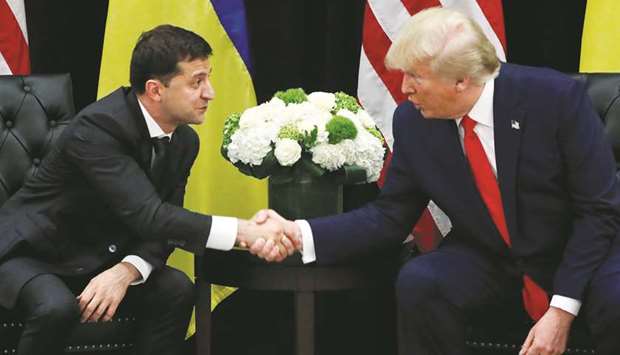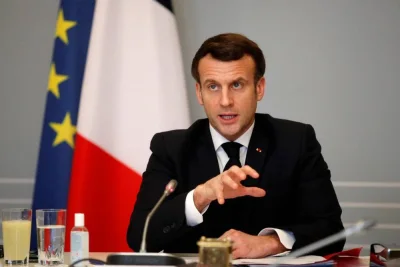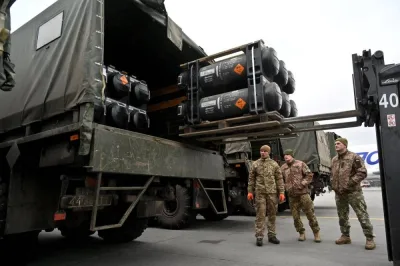Thanks to a newly released trove of US official correspondence, the world now knows just how clumsily the Trump administration tried to get Ukrainian President Volodymyr Zelenskiy to serve its political ends. Perhaps the embarrassment will finally teach the Americans a lesson: This kind of meddling in foreign governments’ affairs will do you no good.
The messages, made public as part of a congressional impeachment inquiry, illustrate the lengths to which top US diplomats went in pursuing their goal: extracting a public pledge from Zelenskiy to investigate whether Ukraine had interfered in the 2016 US election with the aim of helping Hillary Clinton, and whether former vice-president Joe Biden had improperly hindered a Ukrainian money-laundering probe of a company where his son, Hunter, held a lucrative board seat.
The two themes, popular among US conservative conspiracy theorists, are based on zero hard evidence. Biden senior has boasted that he forced former Ukrainian president Petro Poroshenko to fire then prosecutor general Viktor Shokin by threatening to withhold a $1bn US loan guarantee. But there’s nothing to support claims – made by Shokin and President Donald Trump – that Biden did so to stop an investigation into the company, known as Burisma.
Nonetheless, according to the released correspondence, US diplomats worked hard to get Zelenskiy to lend credence to the theories. Gordon Sondland, the US ambassador to the European Union, wrote to Kurt Volker, the US special envoy for Ukraine, that the president wanted Zelenskiy to make the statement, which Sondland called “the deliverable.”
Volker passed the request to Zelenskiy aide Andriy Yermak, and asked other Americans for their input so he could “advise Z correctly as to what he should be saying.”
His proposed words for the Ukrainian president: “We intend to initiate and complete a transparent and unbiased investigation of all available facts and episodes, including those involving Burisma and the 2016 elections, which in turn will prevent the recurrence of this problem in the future.”
Zelenskiy never made the statement – and he couldn’t have, for legal and political reasons. The Ukrainian president doesn’t have the authority to initiate investigations, which are the responsibility of the independent prosecutor. Moreover, he promised voters that he would cast aside his predecessors’ corrupt practices and stop interfering with the workings of the justice system. He reiterated this stance at a September press conference with Trump in New York. (Ukraine’s current prosecutor general said this week that he plans to review the Burisma case, among others.)
Why, then, did Yermak – according to the correspondence – express a willingness to comply with the unusual US demand, in return for a firm date for the Ukrainian president’s visit to the White House? This contrasts with Yermak’s assertion, in an interview with a Ukrainian news site, that he had resisted, telling Trump lawyer Rudy Guiliani that all investigations in Zelenskiy’s administration would be transparent and would not be “opened or closed with a phone call” from Zelenskiy’s staff.
Most likely, Yermak was stringing the Trump team along. A straight “no” would have undermined Zelenskiy’s plan to enlist US support in peace talks with Russia, mediated by Germany and France. Once the Americans set up Zelenskiy’s meeting with Trump, the Ukrainian leader could make some non-committal statement on election interference and Burisma without actually promising an investigation. By then, it would be hard to cancel the White House visit.
In any case, the US diplomats are big losers in the whole fiasco. They failed in their effort to please their impetuous president, and they’ve been caught trying to get a foreign leader to do something improper, showing no concern for the local political consequences.
It’s not the first time that meddling in Ukraine has backfired on US officials. In early 2014, Victoria Nuland, a senior official in the Obama-era State Department, was caught on tape plotting personnel changes in the Ukrainian government, still under beleaguered President Viktor Yanukovych. The plan didn’t work out, but the recording – in which Nuland was heard making a deeply embarrassing profane comment about the European Union – ended up on YouTube, almost certainly with the help of Russian interests. Nuland was forced to apologise to the Europeans.
Biden, too, did his share of incompetent meddling when he was vice president under Obama and in charge of the Ukraine portfolio. The Shokin firing is just one example. Biden’s stated goal was to remove a prosecutor equally hated by Ukrainian anti-corruption activists and Ukraine’s European allies, but Poroshenko replaced Shokin with his close ally Yury Lutsenko, who made political meddling in investigations even easier for the president and his allies.
All this sordid history should tell American diplomats something: It’s none of their business who gets appointed to what job in Kyiv and it’s not for them to decide what a Ukrainian president should say (even if it would look great in a campaign ad). The country can be a valuable ally for the US in a complex region, one that has proven its ability to stand up to Russian pressure in tough situations. But the relationship can benefit both only if Americans practice what they preach – the rule of law, for example, and the primacy of the public good over political gain.
The West has plenty of legitimate ways to keep Ukraine on the right path. These include the specific and transparent policy requirements that the US, Europe and the International Monetary Fund attach to aid packages. The goal – as even Sondland noted in the released correspondence – should be for Ukraine to become a less corrupt, more rules-based country. The kind of crude political bargaining in which US officials have repeatedly engaged in recent years won’t help it get there.
* Leonid Bershidsky is Bloomberg Opinion’s Europe columnist. He was the founding editor of the Russian business daily Vedomosti and founded the opinion website Slon.ru.

Ukraine’s President Volodymyr Zelenskiy greets Trump during a bilateral meeting on the sidelines of the 74th session of the United Nations General Assembly (UNGA) in New York.


